Altair announces winners of 2022 Enlighten Award
Ford, Shiloh Industries, General Motors, Toyota, BASF, Nemak, and McMaster University among winners creating a more sustainable, lightweight future
Altair, the global leader in computational science and artificial intelligence (AI) that provides software and cloud solutions in simulation, high-performance computing (HPC), data analytics, and AI, has named the winners of the 10th annual Altair Enlighten Award.
Presented in association with the Center for Automotive Research (CAR), the Altair Enlighten Award honours the greatest sustainability and lightweighting advancements that successfully reduce carbon footprint, mitigate water and energy consumption, and leverage material reuse and recycling efforts.
“The calibre of nominees for this year’s Enlighten Award was unparalleled and is a true testament to the investments the automotive industry is making to reach – and even exceed – global sustainability targets,” said Richard Yen, senior vice-president, product and strategy, Altair. “As we celebrate our tenth year and have evaluated hundreds of worthy entries over the years, we have seen this award evolve from showcasing vehicle lightweighting initiatives to companies now fully embracing sustainability and the commitment to building a net-zero environment and circular economy.”
"The winners of the 2022 Enlighten Award have demonstrated the great strides the automotive industry has made in creating more sustainable products,” said Carla Bailo, president and CEO, Center for Automotive Research. “Collaborating with Altair over the past ten years has allowed us to showcase on a global stage the automotive sector’s most unique and proven approaches to meet weight reduction and sustainability goals.”
The complete list of all winning organizations, runners-up, and honorable mentions are below:
Category: Sustainable Product
Winner: Ford Motor Company – 2022 F-150 Lightning
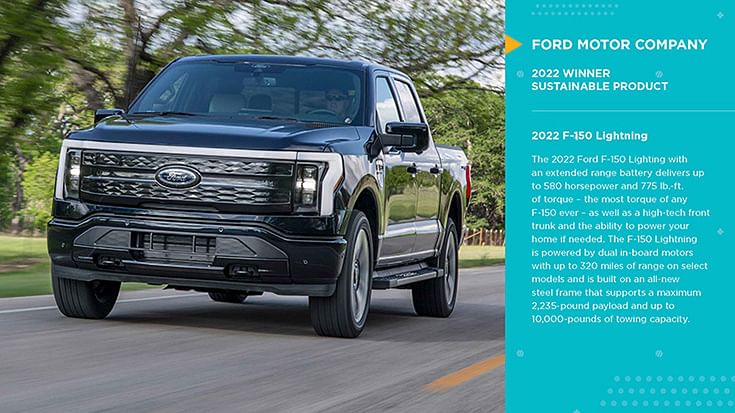
The 2022 Ford F-150 Lighting with an extended range battery delivers up to 580 horsepower and 775 lb.-ft. of torque – the most torque of any F-150 ever – as well as a high-tech front trunk and the ability to power your home if needed. The F-150 Lightning is powered by dual in-board motors with up to 320 miles of range on select models and is built on an all-new steel frame that supports a maximum 2,235-pound payload and up to 10,000-pounds of towing capacity.
Runner-up: Lacks Enterprises – Composite Wheel Technology
Lack Enterprises’ innovative, weight-saving composite wheel technology is recognized in a joint Environmental Protection Agency (EPA) and the National Highway Traffic Safety Administration (NHTSA) report titled “Midterm Evaluation of Light-duty Vehicle Greenhouse Gas Emission Standards and Corporate Average Fuel Economy (CAFE) standards for Model Years 2022-2025.” The patented wheel design allows for multiple finishes and designs on the same wheel backbone offering increased trim level differentiation, while saving costs and optimizing aerodynamics and fuel efficiency.
Category: Sustainable Process
Winner: Nemak – Recycled Materials for Sustainable Manufacturing & Product
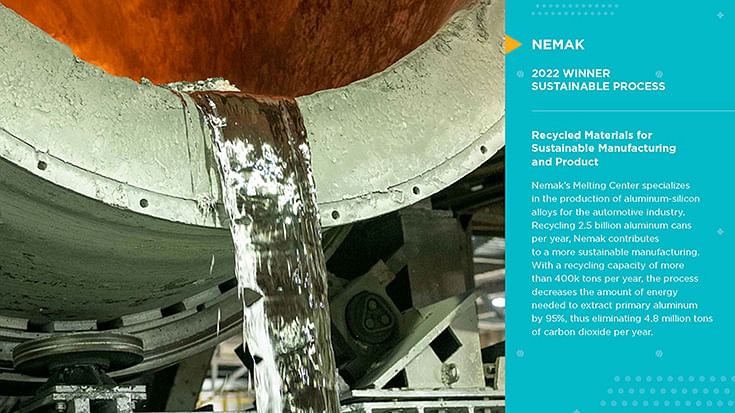
Nemak’s Melting Center specializes in the production of aluminum-silicon alloys for the automotive industry. Recycling 2.5 billion aluminum cans per year, Nemak contributes to a more sustainable manufacturing. With a recycling capacity of more than 400k tons per year, the process decreases the amount of energy needed to extract primary aluminum by 95%, thus eliminating 4.8 million tons of carbon dioxide per year.
Runner-up: ArcelorMittal – First Industrial Large Scale Hydrogen Direct Reduced Iron Test (H2 DRI Test)
ArcelorMittal has launched the first large-scale green trial of hydrogen-based injection in a DRI plant. Through a $10 billion investment plan, this milestone will propel the future large-scale supply of green steel to automotive original equipment manufacturers.
Category: Sustainable Material
Winner: Ford Motor Company – 100% Post-Consumer Recycled Ocean Plastic (PA6) Wiring Harness Clips
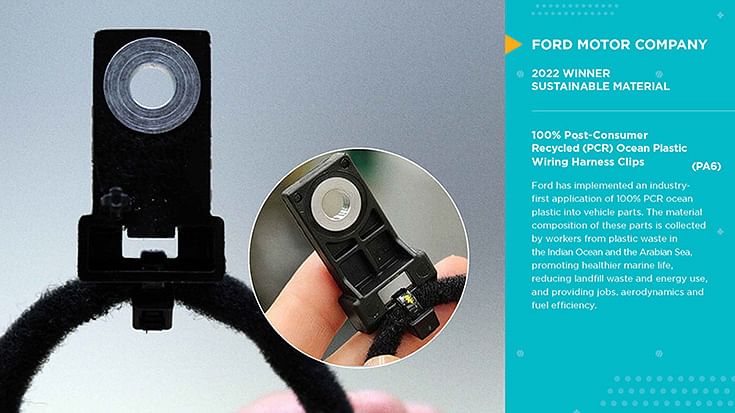
Ford has implemented an industry-first application of 100% PCR ocean plastic into vehicle parts. The material composition of these parts is collected by workers from plastic waste in the Indian Ocean and the Arabian Sea, promoting healthier marine life, reducing landfill waste and energy use, and providing jobs.
Runner-up: Nucor Corporation – Econiq, the World’s First Net Zero Carbon Steel at Scale
As the world’s first net-zero steel produced at scale, Nucor Corporation is pioneering the reduction of a vehicle’s carbon footprint without changing the design or grade selection. Econiq is available to all automotive companies today, has a very high percentage of recycled content, and is the only net-zero steel produced at scale in North America.
Category: Enabling Technology
Winner: Shiloh Industries, General Motors – ShilohCore Acoustic Patch Laminate
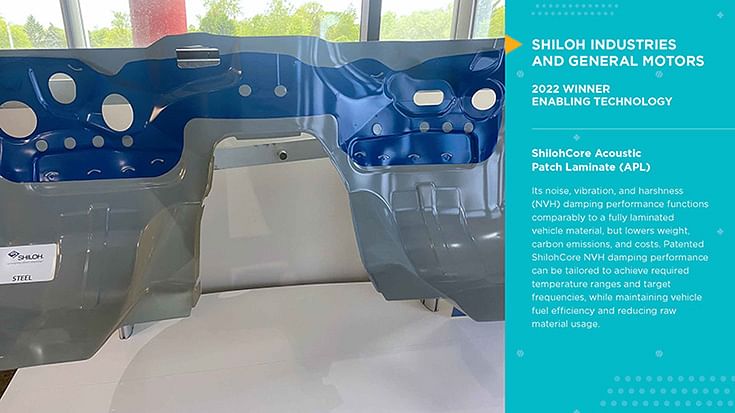
Its noise, vibration, and harshness (NVH) damping performance functions comparably to a fully laminated vehicle material, but lowers weight, carbon emissions, and costs. Patented ShilohCore NVH damping performance can be tailored to achieve required temperature ranges and target frequencies, while maintaining vehicle fuel efficiency and reducing raw material usage.
Runner-up: Bionic Mesh Design GmbH – Bionic Mesh Design
Bionic Mesh Design GmbH has refined and redefined lightweight design for mass casting and forging productions. These lightweight designs are achieved through the direct transformation of topology in CAD models and an emphasis on production processes. By requiring 90% less design time than standard solid modeling processes, Bionic Mesh Design helps automotive OEMs and suppliers get products to market faster.
Runner-up: Human Horizons – Integrated High Pressure Die Casting (HPDC) Rear Cabin
Human Horizons has incorporated high pressure die casting and heat-free treatment material into the manufacturing of their rear cabin, resulting in up to 20% weight reduction. The HPDC Rear Cabin has integrated 40 parts of the rear floor into a single part, thereby cutting manufacturing and mold development time by a third.
Category: Future of Lightweighting
Winner: McMaster University and Nemak – NemAlloy, Novel Lightweight Automotive Aluminum Alloys
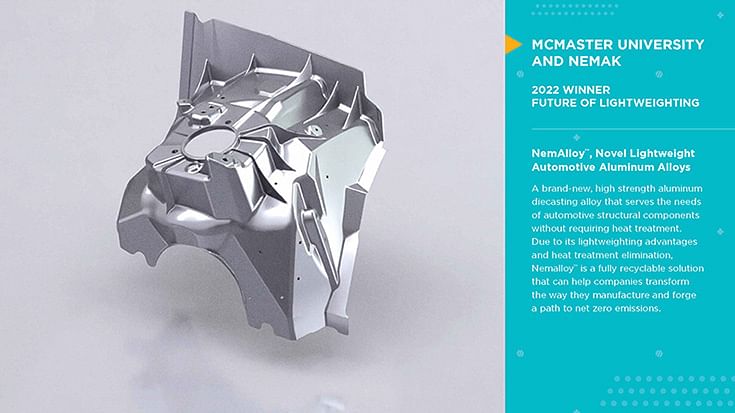
A brand-new, high strength aluminum die casting alloy that serves the needs of automotive structural components without requiring heat treatment. Due to its lightweighting advantages and heat treatment elimination, Nemalloy™ is a fully recyclable solution that can help companies transform the way they manufacture and forge a path to net zero emissions.
Runner-up: Adient – UltraThin Seating

Adient has constructed ultra-thin, reinforced automotive seats made of comfortable, thermoplastic elastomers panels. UltraThin’s design not only saves space and mass, but it also saves labor, time spent in assembly, and materials and part count.
Runner-up: Yanfeng – Instrument Panel and Passenger Air Bag (IP PAB) Integration
The IP PAB integration combines the chute and airbag module housing into one part to lower costs and creates synergies in the development process. Through material substitution and weight savings by 23%, the system reduces the product’s carbon footprint by 50%.
Honorable mention: AMC, csi entwicklungstechnik, DITF, BMW M – NaMiKo Biobased Automotive Center Console
With the goal of a lightweighting and zero-footprint product, the NaMiKo-Project team combined sustainability, methodical lifecycle analysis, and lightweight design to develop an automotive center console using the “NFK in 3D” filament winding process covered with circular “smart textiles,” and bio-based natural fiber composites.
Category: Module Lightweighting
Winner: BASF Corp., Toyota, and L&L Products – Toyota Tundra Second Row Seat Structure
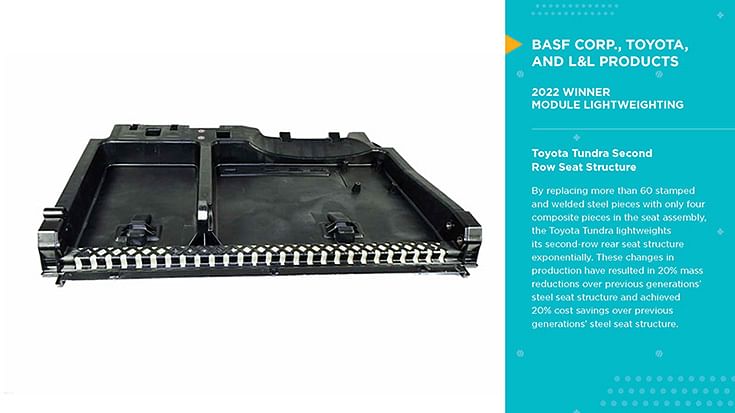
By replacing more than 60 stamped and welded steel pieces with only four composite pieces in the seat assembly, the Toyota Tundra lightweights its second-row rear seat structure exponentially. These changes in production have resulted in 20% mass reductions over previous generations’ steel seat structure and achieved 20% cost savings over previous generations’ steel seat structure.
Runner-up: Bocar Group – Toyota Tundra Rear End Post
The Toyota Tundra Rear End Post – Bocar Lightweight Design is the first of its kind visual class "A" exterior structural die-cast application. It achieves a more sustainable mobility by saving 4.4 kg (9.7 lbs.) in vehicle mass and 78.9 kg (173.9 lbs.) in CO2 emissions per vehicle per year.
RELATED ARTICLES
Autoliv Plans JV for Advanced Safety Electronics With China’s HSAE
The new joint venture, which is to be located strategically near Shanghai and close to several existing Autoliv sites in...
JLR to Restart Production Over a Month After September Hacking
Manufacturing operations at the Tata Group-owned British luxury car and SUV manufacturer were shut down following a cybe...
BYD UK Sales Jump 880% in September to 11,271 units
Sales record sets the UK apart as the largest international market for BYD outside of China for the first time. The Seal...






 By Autocar Professional Bureau
By Autocar Professional Bureau
 08 Aug 2022
08 Aug 2022
 5771 Views
5771 Views
















 Ajit Dalvi
Ajit Dalvi




